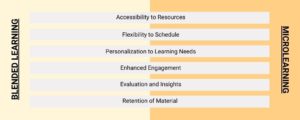
Successful implementation of a CSR initiative, be it diversity, volunteer training, or eco-literacy, involves delivering volumes of subject matter to a large audience in a simplified and effective manner.
With the rising popularity of learning management systems (LMSs) in eLearning design and development, various organizations have been leveraging these online training tools to provide apropos and on-time learning, enhance their CSR initiatives, and achieve the desired social impact. Here are some examples of how this can be done.
Leveraging CALF™ for CSR
Initiatives | Challenges/Requirements | LMS solutions | -Suitable CALFTM features |
Environmental Literacy |
| All the necessary courses on a wide range of topics from global content partners, engaging and interactive learning methodology
| -Short and easily digestible microlearning modules with images, audio, videos, animations, documents, and infographics for better understanding -Gamification with quizzes, polls, leaderboards, points, badges, and automatic certification for engagement -Social learning for better interaction |
Volunteer and leadership training |
| Sticky training experience with multimedia learning modules, short content that can produce immediate results | -Clear, precise, and engaging training through Microlearning -Short content that can easily be accessed and completed on the go in less time -Mobile-first approach to learning for easy online and offline access -Recommendations with new industry-relevant information for exposure to new skills and opportunities |
Improving labor Safety |
| Easily manageable bite-sized information available readily | -Microlearning for creating custom courses on universal labor laws and new industrial developments -Easy access to the latest skills with timely learning recommendations |
Diversity and Inclusion |
| Easily digestible and accessible courses available in multiple languages | -Multilingual content support -Microlearning for all the necessary content available at the fingertips within minutes -Social learning to facilitate engagement and interaction |
Reducing Carbon Emission |
| Mobile-first LMS can eliminate the need for using big computers, going to training venues, and consuming excess paper in tests and training manuals. Relevant training modules on reducing carbon emissions and green practices | -Mobile accessibility through native Android and iOS apps -Simplified, engaging, and more effective training through microlearning |
Water conservation |
| Relevant content available readily Scalability for spreading awareness to a broader audience | -Timely delivery of all critical information in a simplified manner -Mobile accessibility for providing requisite content at scale |
Engaging in charity work |
| On-time delivery of important information | -Monetization and branding of content modules on the eCommerce marketplace -Simplified and effective upskilling with engaging learning content -Multilingual learning for dispersed staff/volunteers -Crisp content in multiple formats that can be consumed on the go
|
Let us dive deeper into some of these points and understand what makes CALFTM LMS so incredibly beneficial for these CSR initiatives.
1. Environmental Literacy
2. Charity Work
3. Water Conservation
4. Improving Labor Safety
Share This Post
Subscribe To Our Newsletter
Get updates and learn from the best
More To Explore

LMS for Professional Training and Coaching Needs
The users of Nuveda’s proprietary CALF™ LMS platform may be found in various industries and functional domains. One such domain is Professional Training and Coaching.

Blended Learning and Microlearning
Blended learning is a method of imparting learning that combines in-person instruction with online learning activities. It integrates technology with traditional classroom methods to enhance


